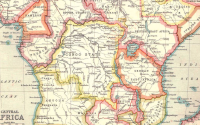By Andrej Grubacic and Ziga Vodovnik
Ancient historian Suetonius, in his The Lives of Twelve Caesars, writes about the attempt of the infamous Roman Emperor Caligula to make his favorite horse, Incitatus, ("Speedy") a consul. American Empire had advanced this animal friendly project by appointing not one horse but a whole stable. The name of this stable is New Europe. As in the case of the Third Emperor of the Roman Empire, the reason for lavishing horses with consular honor has more to do with imperial arrogance then insanity. Just like Caligula's treatment of Incitatus was a way of angering the Senate, New Europe is a way of ridiculing the European Union. This essay is devoted to one particular horse in the stable of New Europe, the horse of the state of Slovenia, and to the recent "Slovenian diplomatic scandal" which, as we contend, is not so much a scandal as it is a model. This essay has a twofold purpose. First, we intend to alert the international left to the nature of American and European colonial politics in the light of the construction of, and manipulation with, the political project of New Europe. Second, we wish to invite the Balkan left to define a politics of balkanization, a politics that would challenge both the imperialist and nationalist scenario for the Balkans.
Let us start with the "Slovenian scandal" which we recognize as a new colonial model. In one of our previous articles we suggested a possible explanation of the nature of American interests in the Balkans (http://www.zcommunications.org/zspace/commentaries/2854). We believe that our conclusions are further confirmed by the events in Slovenia, which, to remind our readers, today holds presidency of the European Union. European leaders woke up to an unpleasant surprise the other day, a leak of an internal document of Slovenian Ministry of Foreign Affairs (MZZ). This document, published in the Slovenian daily Dnevnik and the Serbian daily Politika, reveals content of a meeting between representatives of MZZ and representatives of the US State Department and National Security Agency (NSA),that took place on 24 December 2007 in Washington D.C. Slovenia's willful following of various exotic orders coming not from Brussels (the Senate) but from across the Atlantic (the Emperor), is already a well-known fact in the diplomatic hallways of Europe. But recent developments directly connected with orders and promises that were revealed in this leaked document, can mean the final transfer of our horse to the stable of New Europe, a group of states whose foreign policy is dictated by servile obedience to the United States. This, of course, also means the official end to all illusions about the credibility and importance of the Slovenian Presidency in the EU.
Stubborn pursuit of US interests, or those of the political and economic integration it is a part of, is already a constant of Slovenian foreign policy, or, rather its Foreign Minister, who personalizes and usurps it to a point that exceeds levels of good taste, not to mention old fashioned democratic standards. We remember his – and hence, Slovenian – support of the Vilnius Declaration, which meant New Europe's full support for US intervention in Iraq. In the same vein are also his recent moves, of which we are going to mentioned only a few: public statements about the need for immediate and unconditional independence of the Serbian province of Kosovo; full support of Kosovo's Prime Minister Hashim Thaci, war criminal of repute and former leader of the Kosovo Liberation Army (with a colorful nom de guerre Gjarpni, the Snake); recent lobbying at the International Criminal Court for Former Yugoslavia, to abandon its pressure on officials in Belgrade to gain their full-cooperation in locating Radovan Karadzic and Ratko Mladic. All those actions, for which Slovenian Minister of Foreign Affairs does not have a mandate, gained a very clear context with the document that leaked from Slovenian MZZ a few days ago – as an attempt to follow and realize the US political interests in the Balkans.
The document, with the official markings VWA070767, reveals that the main topic of the meeting between high officials from Slovene MZZ, the State Department, and NSA, has been Slovenia's role during its Presidency of the EU in organizing support for international recognition of Kosovo's unilateral declaration of independence. But the document also reveals other very important and interesting facts about the US involvement in, and planned actions concerned with, the future status of Kosovo. The document that in recent days circulated also on the Internet reveals, inter alia, that the:
* The US suggests that the session of Kosovo's parliament, when they would declare independence of the province, should be held on a Sunday, so the Russian Federation would not be able to call an emergency session of the U.N. Security Council;
* The US proposes the EU ignore any complaints and proposals from Serbia and the Russian Federation; the US estimates that the independence of Kosovo will not gain full support of the EU (only 15 of 27 countries), therefore the support of Slovenia as the Presiding country over the EU is crucial;
* The US plans to avoid giving public statements about the future status of Kosovo in the coming days, but will be among the first to officially recognize Kosovo's independence;
* The US estimates that it is of utmost importance to convince as many states as possible to officially recognize an independent Kosovo in the first few days after the declaration of its independence, and for this reason, the US is intensively lobbying Japan, Turkey, and the Arab states, who have already shown willingness to support Kosovo without hesitation;
* The US is currently helping the Kosovo Albanians draft their new constitution;Now, this document itself is, for understandable reasons, a serious international scandal. The reactions from the mainstream press and EU officials are unanimous in calling it a "spectacular blunder". It clarifies, to the point of truism, the intended role of the New Europe in American imperial design. It provides us with irrefutable evidence of American meddling in the affairs of the European Union. More importantly, it discloses the true nature of US politics of humanitarian intervention (which we propose calling humanitarian imperialism). The document casts a very humiliating picture of the role of Slovenia, as well as other New European Balkan states, in the new colonial system.
We would like to point to another, local dimension of this embarrassment. This is a dimension that concerns the province of Kosovo. There appears to be a curious agreement between the US backed New Europe and Old Europe, an agreement that is uncritically or unreflectively accepted by the international left, about the acceptance, tacit or explicit, of the legitimacy of the Albanian Kosovo leadership; about the support for the independence of Kosovo; about legitimization of the form of colonial rule we term "thacism"; and, finally, about the very framework of solving the Kosovo problem on the level of great power negotiations of the so-called "troika" – i.e., EU, US, Russian Federation.
We ask: Is it possible to achieve the democratization of the region by supporting the Democratic Party of Kosovo (PDK), a political organization of the Kosovo Liberation Army (KLA)? Is it possible to achieve democratization of Kosovo by supporting the former KLA leader, and now Prime Minister, Hashim Thachi? Are we not then supporting, instead of democratization, the continuation of the nationalist logic and a process of further ethnic cleansing of Kosovo? These are not academic questions. In March 2000, former UN Special Investigator for the former Yugoslavia Jiri Dienstbier reported to the UN Commission on Human Rights that "330,000 Serbs, Roma, Montenegrins, Slavic Muslims, pro-Serb Albanians and Turks had been displaced in Kosovo – double the earlier estimates. What that means is most of Kosovo's minorities no longer are in their original homes." In this respect, things have only deteriorated since Dienstbier's report was submitted. You will forgive our skepticism as to the fact that Thaci, a principal protagonist of Kosovo’s flourishing industry of arms, drug and sex trafficking, will prevent the inevitable ethnic violence, or that he will strive for the restoration of democracy, multiculturalism, and the rule of law in the independent Kosovo.
And whose independent Kosovo is it going to be? Let us try to explain the western fascination with "thacism". Former Special Representative to the Secretary General of the UN in Kosovo, Sergio Vieira de Mell, was often quoted to complain: "Madeleine Albright is in love with Thaci. Jamie Rubin is his best friend. It's not helpful. Thaci arrived here with the impression that he has the full weight of the American government behind him. He believes he has earned the right to rule." In the past few years "thacism" was somewhat modified, so as to answer to a different reality, but only on the superficial level of rhetoric – with more or less successful distancing from ideas of a great Kosovo and/or Albania – meanwhile in practice it stayed more or less the same, with the usual mix of murders, kidnappings, and violent attempts to crackdown political opponents. But we should not overestimate Thaci, who, as his nickname suggests, is a reptile of minor importance. Thaci is important only as a metaphor of thacism, a form of colonial rule by way of support of local warlords whose job it is to destroy any inkling of anti-colonial protest.
We had written about the problem of Kosovo before, and at some length. Our position, let us summarize it briefly, is that the international Left should not support the nationalist option (Serbian or Albanian), even when it is temptingly served in the guise of self-determination, and should most resolutely refuse to accept the imperialist option imposed, in a confused fashion, as evidenced in the above document, by the USA and the EU. The whole tragic history of the Balkans is one of colonialism and resistance to western colonialism. The so-called "troika", international community, great powers, or however they choose to call themselves, have no business in the Balkans. The form of colonialism that we have proposed to call "thacism" is indigenous to the Balkans the same way Thacherism was the politics of the British workers. It should not enjoy support from the international left. What is much more important, The Balkan left has to step up to the challenge, and define a coherent and regional anti-colonial politics that is in keeping with it's rebellious, heretical history. The resistance is well under way. Factories in Serbia are being occupied by the workers struggling against privatization and for new definitions of the "transition" (http://www.zcommunications.org/znet/viewArticle/16230). The "Erased" of Slovenia are pointing ways to resistance formulated not in the name of nationality but of dignity (http://transform.eipcp.net/correspondence/1168862569/print). The Roma, persecuted, as always, are organizing against the imposed mono-ethnicity of Kosovo. This is our Balkans. We need a new Balkans, built from below, and we need a New Europe, built from below. We need to go back to the historical project of the Balkans without nations, to the project of Balkan federation. We believe that the Kosovo question can only be answered in a regional framework, and we believe that the Balkans can provide a model for another Europe, a balkanized Europe of regions, as an alternative to both transnational European super-state and nation-states. The future of the Balkans is not in Europe. But the future of Europe is in the Balkans.
If the local political elites are happy being horses, ridden by European Senators or American Emperors, we should indulge them, but we need to get them another stable.
Andrej Grubacic and Ziga Vodovnik are anarchist writers from the Balkans. They are members of the editorial board of Balkan Z Magazine. You can reach them at [email protected] and [email protected]






